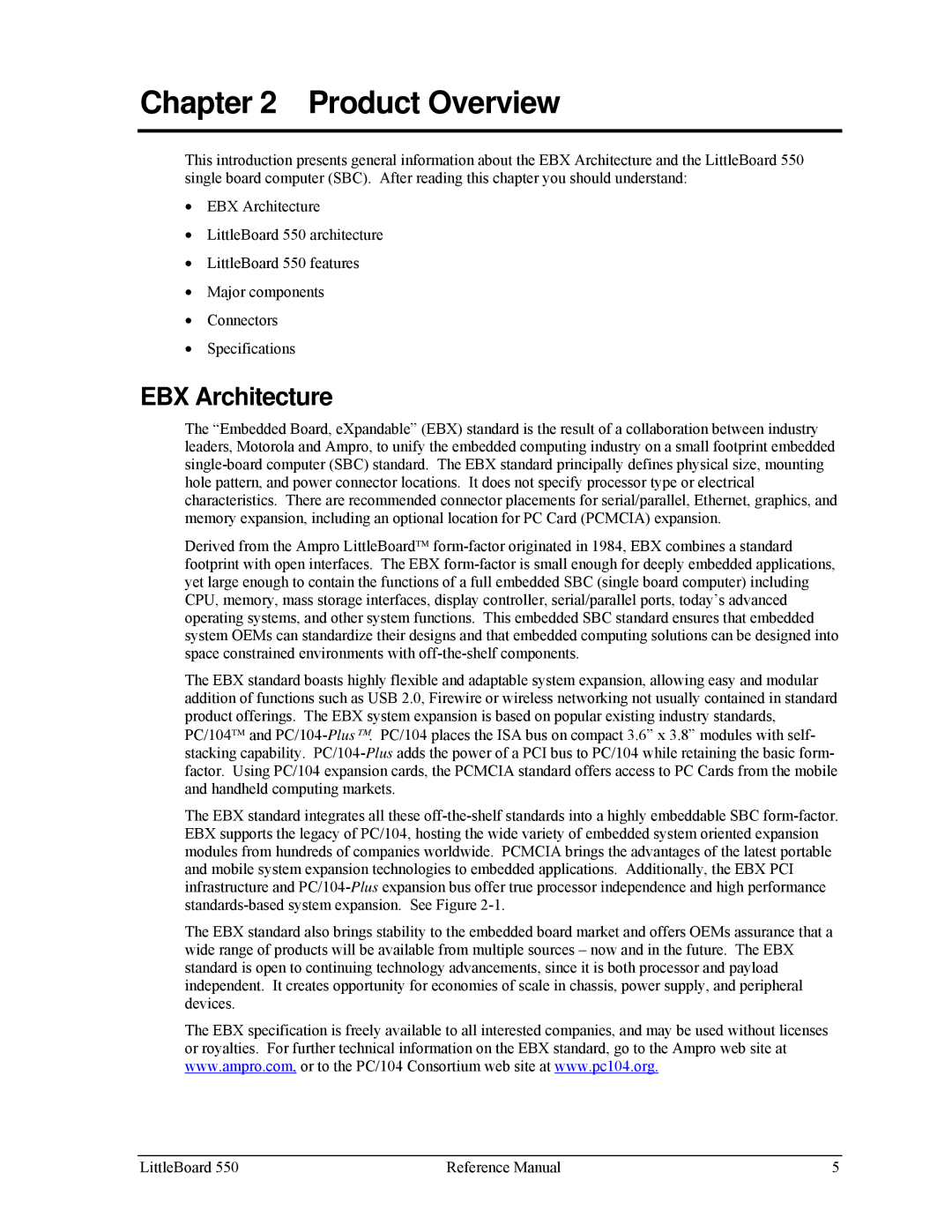Chapter 2 Product Overview
This introduction presents general information about the EBX Architecture and the LittleBoard 550 single board computer (SBC). After reading this chapter you should understand:
•EBX Architecture
•LittleBoard 550 architecture
•LittleBoard 550 features
•Major components
•Connectors
•Specifications
EBX Architecture
The “Embedded Board, eXpandable” (EBX) standard is the result of a collaboration between industry leaders, Motorola and Ampro, to unify the embedded computing industry on a small footprint embedded single-board computer (SBC) standard. The EBX standard principally defines physical size, mounting hole pattern, and power connector locations. It does not specify processor type or electrical characteristics. There are recommended connector placements for serial/parallel, Ethernet, graphics, and memory expansion, including an optional location for PC Card (PCMCIA) expansion.
Derived from the Ampro LittleBoard™ form-factor originated in 1984, EBX combines a standard footprint with open interfaces. The EBX form-factor is small enough for deeply embedded applications, yet large enough to contain the functions of a full embedded SBC (single board computer) including CPU, memory, mass storage interfaces, display controller, serial/parallel ports, today’s advanced operating systems, and other system functions. This embedded SBC standard ensures that embedded system OEMs can standardize their designs and that embedded computing solutions can be designed into space constrained environments with off-the-shelf components.
The EBX standard boasts highly flexible and adaptable system expansion, allowing easy and modular addition of functions such as USB 2.0, Firewire or wireless networking not usually contained in standard product offerings. The EBX system expansion is based on popular existing industry standards, PC/104™ and PC/104-Plus™. PC/104 places the ISA bus on compact 3.6” x 3.8” modules with self- stacking capability. PC/104-Plusadds the power of a PCI bus to PC/104 while retaining the basic form- factor. Using PC/104 expansion cards, the PCMCIA standard offers access to PC Cards from the mobile and handheld computing markets.
The EBX standard integrates all these off-the-shelf standards into a highly embeddable SBC form-factor. EBX supports the legacy of PC/104, hosting the wide variety of embedded system oriented expansion modules from hundreds of companies worldwide. PCMCIA brings the advantages of the latest portable and mobile system expansion technologies to embedded applications. Additionally, the EBX PCI infrastructure and PC/104-Plusexpansion bus offer true processor independence and high performance standards-based system expansion. See Figure 2-1.
The EBX standard also brings stability to the embedded board market and offers OEMs assurance that a wide range of products will be available from multiple sources – now and in the future. The EBX standard is open to continuing technology advancements, since it is both processor and payload independent. It creates opportunity for economies of scale in chassis, power supply, and peripheral devices.
The EBX specification is freely available to all interested companies, and may be used without licenses or royalties. For further technical information on the EBX standard, go to the Ampro web site at www.ampro.com, or to the PC/104 Consortium web site at www.pc104.org.

